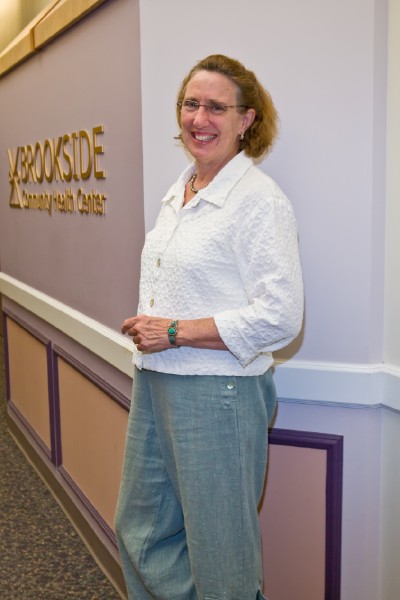Department of Nursing Launches Global Nursing Fellowship

Kate Sullivan is the Department of Nursing’s first Global Nursing fellow.
This summer, Kate Sullivan, MSN, RN, CNM, is brushing up on her French, training in first trimester ultrasound and garnering a support network of midwives, nurses, physicians and others as she prepares for a six-month fellowship in Africa. In September, Sullivan will head for rural Rwanda as the first BWH Global Nursing Fellow.
The fellowship was developed jointly by the Department of Nursing and the Division of Social Medicine and Health Inequalities as a way to identify contributions of nursing in developing countries and implement effective treatments, provide opportunities for BWH nurses to participate in clinical field rotations around the world and to develop nursing’s role in interdisciplinary care models globally.
Sullivan, who previously volunteered in El Salvador and Nicaragua with health care activist groups, will work closely with a nurse mentor, Emily Hall, MSN, MPH, RN, of Partners In Health, and other Division of Social Medicine and Health Inequalities and Partners In Health staff while in Rwanda.
“I expect I’m going to learn a huge amount,” said Sullivan, who has worked for 30 years at Brookside Community Health Center and the BWH Midwifery Group. “I could not be more excited about this opportunity and to work with Partners In Health. They are changing things on the global scale.”
The fellowship is one arm of the Department of Nursing’s commitment to Global Nursing. “With the recent support of donor funding, we have been able to expand our commitment to global nursing efforts with the development of a global nursing agenda and a partnership with the Division of Social Medicine and Health Inequalities,” said Patrice Nicholas, DNSc, MPH, RN, ANP, director of Global Nursing. “To help create that agenda, the Center for Nursing Excellence has developed a roadmap that will help prepare nurses to provide culturally competent care locally and internationally.”
Nursing is supportive of other department-led international efforts for nurses throughout the hospital. In April, cardiac surgery nurses and others on Team Heart launched a ten-year mission to King Faisal Hospital in Kigali, Rwanda, to perform surgery and help the hospital create a self-sustaining program. That same month, a team from Orthopedics called Operation Walk Boston visited the Dominican Republic to perform hip and knee replacements on those who could not afford surgery. Many nurses have volunteered for international work on an individual basis, including Tess Panizales, MSN, RN, of the Center for Surgery and Public Health, who used her February vacation to volunteer in a women’s hospital in Nairobi, Kenya.
“We truly support nurses who are interested in international work and the emerging field of global health,” Nicholas said. “We are committed to helping nurses share their knowledge and skills in resource-limited settings and to furthering access to care.”
In Nicholas, the department has an expert leader in this growing field of global nursing. A Fulbright scholar, Nicholas taught masters and doctoral nursing students at the University of KwaZulu-Natal in South Africa, practiced at two area hospitals and two hospices. She also conducted research studies on adherence to HIV and TB medications.
“Like all global nursing work, the purpose of this fellowship is to share the excellent skills we have here at the Brigham with patients and care providers in other places, like Rwanda,” Nicholas said. “We want Kate, with her midwifery skills, to advance women’s health care and share the advanced practice nursing role in Rwanda.”
Sullivan, who was selected from a pool of 10 talented and qualified applicants, is learning all she can about Rwanda and Rwinkwavu Hospital, where she will deliver nurse-midwifery care, work alongside Rwandan caregivers and aim to help solve problems.
The hospital has a comprehensive plan to reduce maternal morbidity and mortality, and Sullivan will be part of building a team that concentrates on this and other women’s health issues.
Sullivan will take into account social and economic hardships that affect the health of her patients, much as she does on a daily basis at Brookside. “Midwives embody the community aspect of the Brigham’s mission,” she said. “We are in the community providing care every day to a very complex patient population, mostly because of the social risk they face.”
Miriam Mahler, MPH, RN, CNM, director of the BWH Midwifery Group, praised Sullivan’s commitment to learning about the difficulties in her patients’ lives so that she can provide the best care. “I believe her patients always have recognized the thoroughness and gentleness of her care, as well as her appreciation for the realities of their lives and the intersection of social conditions with health care outcomes,” Mahler said.
Sullivan is turning to her fellow experts at BWH to help prepare for this experience. Carol Benson, MD, of Radiology, along with Mary Frates, MD, and Tom Shipp, are teaching her to perform first-trimester ultrasounds that will help guide end-of-pregnancy care for patients in Rwanda. Sullivan has asked Carol Luppi, BSN, RN, of the Center for Nursing Excellence, for help with technology questions, and the American College of Midwives has connected her with her peers who frequently participate in this type of international work.
The close-knit Midwifery Group and nurses on Labor and Delivery have extended their full support to Sullivan. “We are so team-oriented here, and I plan to rely on my team when I have questions or need advice,” she said. “I’ll just be on a different continent.”
Sullivan plans to send updates to BWH Nurse from Rwanda. Stay tuned!